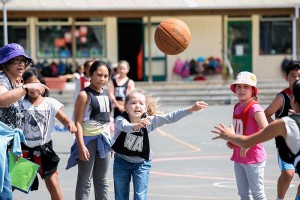Information for Students Transferring to Newtown
A positive move to Newtown School is good for your child’s future…
 Starting school is an important time in a child’s life. Rather than a one-off event, transition is a process where children settle into learning. Children and families experience it in their own way and in their own time.
Starting school is an important time in a child’s life. Rather than a one-off event, transition is a process where children settle into learning. Children and families experience it in their own way and in their own time.
When children start school, they experience changes in:
- how they’re expected to learn, behave and spend their time
- relationships
- teaching approach
- their environment and space
- what they learn.
Helping children to have positive and rewarding experiences as they move from early childhood education to school sets them confidently on a continuous pathway of learning for life.
Building Strong Relationships
Newtown School believes in building strong relationships with your child and you as parents, whānau and caregivers.
Transitions to school involve the whole family. At Newtown we enrol your whole family! Newtown School is your School.
You as parents and whānau play an important role in your child’s ongoing learning.
Some early childhood services have a key teacher for each child so parents have a dedicated person to ask for information and support.
Services and schools might hold parent evenings about transition to school, give information packs to whānau and transition books to children, and set up visits to help parents make informed choices about schools.
Enrolment interviews can offer a chance for the whānau to meet people at the school and for school leaders and teachers to find out as much as they can about the child and what their parents want for them.
Genuine partnerships and two-way communication helps the child’s family and school leaders, teachers and other staff work together to support your child’s learning.
Children’s ‘dispositions’ influence how they learn
Dispositions are combinations of children’s emerging knowledge, skills and attitudes to learning. They include characteristics like courage, curiosity, trust, playfulness, perseverance, confidence and responsibility. They include the way children approach learning, such as persisting with difficulty or expressing a point of view. The early childhood curriculum Te Wha-riki encourages early childhood teachers to help children develop dispositions that help them learn.
Getting to know your children and how they learn
Leaders and teachers can help children settle into school by basing transition programmes on children’s interests and building on what they already know and can do.
- Learning about and connecting the early childhood curriculum Te Whariki and The New Zealand Curriculum or Te Mauratanga o Aotearoa for schools is important.
- Getting to know each child – including finding out about their strengths, interests, culture and capabilities, and their parents’ aspirations for them – can help to design curriculum to suit each child.
- Maori and Pacific children can be supported in their sense of belonging by making their language and culture part of the curriculum and environment.
- For children with English as a second language, teachers learning and using words from the child’s first language can help.
- Information about support needed for children with special education needs should be shared and applications for funding started early so that support is continuous or in place once the child moves to school.
Early childhood services and Newtown School are working together…
In some early childhood services most children move to just one local school, while in others children move to many different schools across our city. This can affect how easy it is for leaders and teachers at early childhood services and schools to build and maintain.
- Working together is more than just visits in the time leading up to children starting school.
- Seeing children in their familiar early childhood environment can help new entrant teachers add to the information provided through portfolio books or other records of learning.
- Two-way visits between an early childhood service and a school can help children connect with older children already at school and get used to the school environment.
- Two-way visits between teachers can help them understand what the teaching and learning looks like in each place and how they can connect these experiences for children starting school.
- To support some children, early childhood services and schools also need collaborative relationships with external agencies and specialists – such as speech-language therapists, early intervention teachers, advisers on deaf children, Child, Youth and Family staff and providers of ‘B4 School checks’ such as Plunket,

